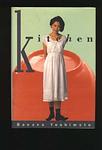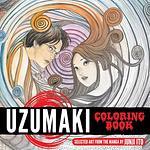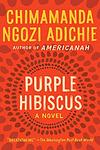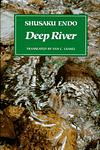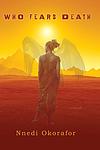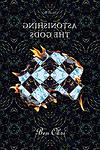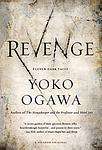The Greatest Nigerian, Japanese "Fiction" Books Since 1980
Click to learn how this list is calculated.
This list represents a comprehensive and trusted collection of the greatest books. Developed through a specialized algorithm, it brings together 300 'best of' book lists to form a definitive guide to the world's most acclaimed books. For those interested in how these books are chosen, additional details can be found on the rankings page.
Genres
Countries
Date Range
Reading Statistics
Click the button below to see how many of these books you've read!
Download
If you're interested in downloading this list as a CSV file for use in a spreadsheet application, you can easily do so by clicking the button below. Please note that to ensure a manageable file size and faster download, the CSV will include details for only the first 500 books.
Download-
1. The Wind-Up Bird Chronicle by Haruki Murakami
A man's search for his wife's missing cat evolves into a surreal journey through Tokyo's underbelly, where he encounters a bizarre collection of characters with strange stories and peculiar obsessions. As he delves deeper, he finds himself entangled in a web of dreamlike scenarios, historical digressions, and metaphysical investigations. His reality becomes increasingly intertwined with the dream world as he grapples with themes of fate, identity, and the dark side of the human psyche.
-
2. Never Let Me Go by Kazuo Ishiguro
The novel is a haunting tale of three friends, who grow up together at a seemingly idyllic English boarding school. As they mature, they discover a dark secret about their school and the purpose of their existence, which is to become organ donors for the rest of society. The story is a profound exploration of what it means to be human, the morality of scientific innovation, and the heartbreaking reality of love and loss.
-
3. Half of a Yellow Sun by Chimamanda Ngozi Adichie
The novel is set in Nigeria during the Biafran War, exploring the impact of the conflict on the lives of its characters. The story is told from the perspective of three characters: a young houseboy, a radical university professor, and the professor's wealthy lover. The narrative delves into themes of love, race, and war, offering a vivid depiction of the horrors of conflict and the resilience of the human spirit.
-
4. The Famished Road by Ben Okri
The novel centers around the life of an abiku, a spirit child, who resides in the bustling city of Lagos. Despite numerous attempts to return to the spiritual world, the boy is tethered to the physical realm through the love of his mother. As he navigates through the political unrest and poverty of post-colonial Nigeria, he experiences a series of surreal and mystical encounters, all while wrestling with the pull of the spirit world. The narrative is a blend of reality and the supernatural, providing a unique perspective on the struggles and complexities of human life.
-
5. Americanah by Chimamanda Ngozi Adichie
The novel follows a young Nigerian woman who emigrates to the United States for a university education. While there, she experiences racism and begins blogging about her experiences as an African woman in America. Meanwhile, her high school sweetheart faces his own struggles in England and Nigeria. The story is a powerful exploration of race, immigration, and the complex nature of identity, love, and belonging.
-
6. Norwegian Wood by Haruki Murakami
Set in Tokyo during the late 1960s, the novel follows a college student as he navigates a complex love triangle while grappling with his own mental health and the societal pressures of the time. He's torn between his love for a beautiful but emotionally troubled woman and his growing feelings for a lively, outgoing classmate. As he confronts his past, present, and future, the narrative explores themes of love, loss, and personal growth.
-
7. A Wild Sheep Chase by Haruki Murakami
A Wild Sheep Chase follows the story of a recently divorced advertising executive in Tokyo who is given a mysterious assignment by a sinister, powerful man: to find a particular sheep with a star-shaped birthmark. This mission leads him to travel across the snowy landscapes of Northern Japan, crossing paths with peculiar characters, and exploring themes of loneliness, fate, and identity. The narrative is a blend of detective story, postmodern critique, and surreal journey, infused with the author's unique style of magical realism.
-
8. Kafka On The Shore by Haruki Murakami
"Kafka On The Shore" is a surreal and philosophical novel by Haruki Murakami that follows two parallel storylines. The first is that of Kafka Tamura, a 15-year-old boy who runs away from home to escape an Oedipal prophecy and searches for his missing mother and sister. The second storyline follows Nakata, an elderly man who has lost his memory but possesses the ability to communicate with cats. As their paths converge, they encounter strange and mystical events that challenge their perceptions of reality and identity. The novel explores themes of fate, free will, and the human psyche, and is a captivating and thought-provoking read.
-
9. Hard-Boiled Wonderland and the End of the World by Haruki Murakami
In this novel, two parallel narratives intertwine, one following a data encryptor in a dystopian, futuristic Tokyo who becomes embroiled in the machinations of a mysterious scientist and his granddaughter, the other set in a surreal, dreamlike town where a man is tasked with reading old dreams from unicorn skulls. As the story progresses, it becomes evident that the two worlds are connected in a profound and unsettling way, leading to a shocking conclusion that explores themes of consciousness, identity, and the nature of reality.
-
10. Kitchen by Banana Yoshimoto
The book is a poignant tale of love, life, and loss intertwined with the themes of food and kitchens. The narrative follows a young woman who, after the death of her grandmother, finds solace in the home of her friend and his transgender mother. As she navigates her grief, she also grapples with her growing feelings for her friend. The story explores the complexities of relationships, the concept of home, and the healing power of cooking.
-
11. Akira by Katsuhiro Otomo
Set in a post-apocalyptic Neo-Tokyo, this graphic novel follows the lives of two teenage friends, Tetsuo and Kaneda, who are members of a biker gang. After a motorcycle accident, Tetsuo develops telekinetic abilities and is taken by the military, which fears his growing powers might unleash another cataclysmic event similar to the one that destroyed Tokyo years earlier. As Tetsuo's powers spiral out of control, Kaneda, along with a group of rebels and psychics, must try to stop him and uncover the secrets of a mysterious entity known as "Akira," which is at the heart of the government's experiments and the city's destruction. The narrative explores themes of power, corruption, and the quest for identity against a backdrop of cyberpunk visuals and intense action.
-
12. 1Q84 by Haruki Murakami
The novel is a complex and surreal narrative that intertwines the lives of two protagonists: a woman assassin who becomes embroiled in a mysterious and dangerous cult, and a male writer caught in a complicated love triangle. As they navigate their respective challenges, they unknowingly cross into an alternate reality, referred to as 1Q84, where the lines between fact and fiction blur. The novel explores themes of love, fate, and the power of the individual against the constraints of a conformist society.
-
13. Uzumaki by Junji Ito
The book is a horror manga that centers around a small fog-bound Japanese town cursed by supernatural events involving spirals. As the obsession with the spiral pattern begins to spread among the townspeople, it manifests in increasingly bizarre and terrifying ways, warping both the minds of the inhabitants and the very fabric of the town itself. The narrative follows a high school teenager and her boyfriend as they struggle to understand and survive the madness engulfing their once-peaceful home, revealing the spiral's hypnotic and monstrous influence on both the human psyche and the natural world.
-
14. Purple Hibiscus by Chimamanda Ngozi Adichie
"Purple Hibiscus" follows the story of a 15-year-old Nigerian girl, Kambili, and her older brother Jaja, who live a privileged life in Enugu. However, their father is a religious fanatic and a domestic tyrant. The siblings are sent to their Aunty Ifeoma's home, a university professor, who provides them a taste of freedom and shows them a different way of life outside their father's oppressive rule. The novel explores themes of colonialism, religious fanaticism, and the post-colonial political situation in Nigeria.
-
15. Children Of Blood And Bone by Tomi Adeyemi
In a world where magic has been suppressed and the maji people have been oppressed, Zélie, a young maji girl, embarks on a dangerous quest to restore magic and bring justice to her people. Alongside her brother and a rogue princess, Zélie must confront her own powers and face formidable enemies, navigating a treacherous landscape of betrayal and sacrifice. As they race against time, Zélie discovers that she may hold the key to not only saving her people, but also to changing the destiny of their entire nation.
-
16. Out by Natsuo Kirino
"Out" by Natsuo Kirino is a gripping and dark psychological thriller set in Tokyo. The story revolves around four women who work the night shift at a factory and become entangled in a web of murder and cover-up. As they struggle to dispose of a dead body, their lives quickly spiral out of control, revealing their hidden desires and the depths they are willing to go to protect themselves. With its intense plot and exploration of societal pressures and gender dynamics, "Out" is a compelling and thought-provoking read.
-
17. Deep River by Shūsaku Endō
"Deep River" is a profound exploration of faith, suffering, and redemption, told through the intertwined narratives of four Japanese survivors of World War II. Each character carries their own personal trauma and guilt, leading them on separate spiritual journeys that converge at India's holy Ganges River. As they grapple with their pasts and seek forgiveness and meaning in their lives, the novel delves into themes of cultural clash, religious conflict, and the human capacity for love and understanding amidst pain.
-
18. The Stillborn by Zaynab Alkali
"The Stillborn" is a poignant narrative that explores the lives of women in a traditional African society, focusing on their struggles, resilience, and the quest for personal identity. The story delves into the complexities of polygamy, cultural expectations, and the impact of modernity on rural communities. Through the experiences of its female protagonists, the novel highlights the challenges faced by women in their pursuit of education, autonomy, and fulfillment in a male-dominated environment, ultimately offering a critique of the societal norms that stifle their growth and the transformative power of self-awareness and communal support.
-
19. Crossfire by Miyuki Miyabe
Crossfire is a suspenseful novel that follows the life of a young woman who possesses pyrokinetic abilities, allowing her to start fires with her mind. She uses her powers to avenge victims of violent crimes, but her actions attract the attention of a determined detective. As she continues her vigilante justice, she becomes embroiled in a conspiracy involving a religious cult and must confront her own past and the consequences of her actions.
-
20. Requiem by Shizuko Gō
"Requiem" is a poignant novel that delves into the emotional and psychological aftermath of the atomic bombing of Hiroshima. Through the eyes of its protagonist, a woman who survived the blast as a child, the narrative explores the enduring scars left by the tragedy, both on the city's landscape and its inhabitants' lives. As she grapples with her past trauma and the loss of her family, the story reveals the long-term effects of nuclear warfare and the struggle for healing and redemption amidst the pain of irrevocable loss. The novel serves as a powerful meditation on memory, survival, and the resilience of the human spirit in the face of unimaginable devastation.
-
21. The Decagon House Murders by Yukito Ayatsuji
In a secluded island, seven university students gather at the Decagon House to spend their summer vacation. However, their peaceful retreat quickly turns into a nightmare when one of them is found dead, mimicking a murder described in a mystery novel. As more bodies appear, the remaining students must unravel the secrets of the Decagon House and uncover the identity of the killer before they become the next victims. With a thrilling blend of suspense and intricate puzzles, this book keeps readers on the edge of their seats until the shocking truth is revealed.
-
22. Who Fears Death by Nnedi Okorafor
This novel is a coming-of-age narrative set in a post-apocalyptic Africa. It follows the journey of a young woman born from a violent act, who is prophesied to bring an end to a brutal regime. As she grows, she discovers her magical abilities and must learn to control them in order to fulfill her destiny. The narrative explores themes of race, gender, and power, while incorporating elements of African mythology and culture.
-
23. Astonishing the Gods by Ben Okri
"Astonishing the Gods" is a mystical exploration of the intersection of the visible and invisible worlds. The protagonist is an invisible man who embarks on a spiritual journey, seeking knowledge and truth. Along his journey, he encounters various gods and mythical beings, each imparting wisdom and insights. The narrative is a blend of poetry, philosophy, and storytelling that challenges the reader's perception of reality, encouraging them to question the nature of existence and the power of imagination.
-
24. Revenge: Eleven Dark Tales by Yoko Ogawa
This collection delves into the unsettling corners of the human psyche through eleven interconnected stories that explore themes of desire, pain, and retribution. Each tale weaves a haunting narrative where characters confront peculiar incidents and twisted relationships, often finding themselves entangled in situations where the line between reality and the surreal blurs. The stories, set against the backdrop of everyday life in Japan, reveal the quiet horror lurking beneath the surface of ordinary encounters, as the protagonists grapple with the consequences of their dark obsessions and the inexorable pull of vengeance.
-
25. Anthills Of The Savannah by Chinua Achebe
This novel explores the political turmoil and corruption in a fictional West African country following a military coup. Through the lives of three childhood friends who have risen to positions of power and influence, the narrative delves into themes of leadership, betrayal, and the quest for democracy in a post-colonial African society. As the country teeters on the brink of chaos, the characters' personal and political dilemmas reflect the broader struggles of a nation grappling with its identity and governance. The story is a poignant commentary on power, the complexities of freedom, and the enduring human spirit amidst societal upheaval.
Reading Statistics
Click the button below to see how many of these books you've read!
Download
If you're interested in downloading this list as a CSV file for use in a spreadsheet application, you can easily do so by clicking the button below. Please note that to ensure a manageable file size and faster download, the CSV will include details for only the first 500 books.
Download








